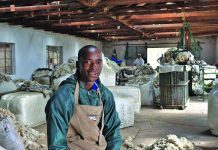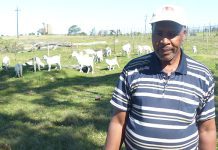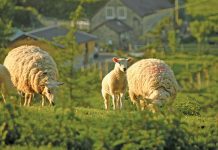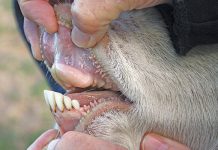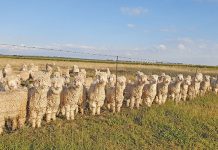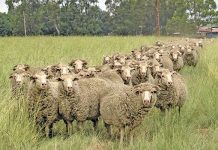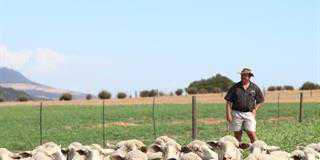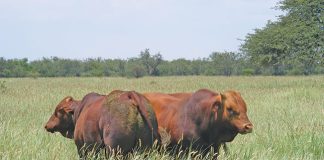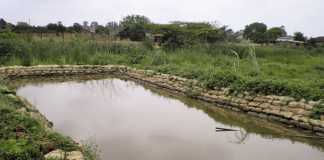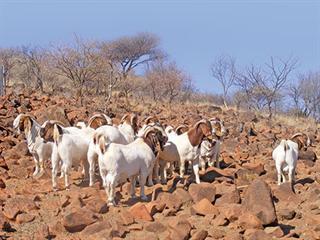
The last ten years have seen a radical change on the farm of Sollie Kriek and his sons Sarel and Kobus. Their operation, near Amalia in North West, was focused on cattle and game, but the Krieks kept a commercial Boer Goat flock as a sideline.
Hardy and well-adapted, they required relatively few inputs and did not distract from the main business of the farm.
As time went by, the Krieks realised that they could benefit from the growing popularity of Boer Goats. So in 2004, they converted their commercial flock to the Schoonheid Boer Goat Stud. This was an immediate success, and the stud now has 240 ewes and makes up about 70% of farm turnover. “We realised there was money to be made from Boer Goats,” Sarel explains. “Returns on investing in the best genetics are considerable. Our rams regularly sell for between R50 000 and R100 000 each. This makes stud breeding a viable economic option for us.”
A top stud ram
“It was a good decision to acquire the best genetics from the outset,” says Sarel. “Initially we bought 57 six-tooth and eight-tooth ewes with proven breeding ability from the late Nico Botha in Britstown. These ewes and their offspring formed the foundation of our stud. One of the wisest choices we made was to buy the ram Rommel SD 21 at Nampo in 2004. We paid R50 000 for him, which was a high price at the time.”
This exceptional ram played a decisive role in the success of the Schoonheid stud. No fewer than nine World Champion rams and ewes were bred from him. His genetics were exported to Australia, where one of his offspring became an Australian Grand Champion. An eight-tooth Rommel son was World Champion and Reserve Grand Champion at this year’s Boer Goat World Championships in South Africa.

(From left): Kobus, Sollie and Sarel Kriek turned their Boer Goat sideline into a lucrative stud.
Although he died several years ago, Rommel’s genetics and offspring are still sought-after worldwide. Schoonheid owns a number of prized Rommel semen straws. The Krieks are uncompromising on selection, and choose rams on estimated breeding values, visual appraisal and strong dam lines. All breeding animals comply with the breeding standards of the SA Boer Goat Breeders’ Society.
“The ideal Schoonheid ewe is a well-adapted, fertile and hardy animal that can wean multiple lambs. She is feminine and slightly wedge-shaped. “The ideal ram is masculine with a supple skin and a heavy head, neck and forequarters. Our animals thrive under extensive conditions and we slaughter whatever doesn’t meet required parameters,” explains Sarel.
Good choice for diversification
Sarel sees Boer Goats as an excellent option for diversification in the Amalia area because of their browsing ability. There are several highly nutritious shrubs in the sweetveld, including rosyntjiebos (Searsia pendulina), vaalbos (Terminalia sericea), buffalo thorn (Ziziphus mucronata) and karee (Searsia lancea), all ideal for Boer Goats. He estimates that the goats obtain more than 70% of their daily intake through browsing, which has helped to reduce production costs during the current drought. The goats have kept their condition and have not needed more supplement than usual.
“Dry ewes on the veld get 100g lucerne pellets or maize every afternoon,” says Sarel. “Boer Goats are creatures of habit and return to the feeding points in the afternoon. This helps us keep track of them and stops them from fence-crawling.”
Lactating and pregnant ewes are kept on a mixture of ryegrass, clover and tall fescue in 2ha camps, each divided into four sections.
“Irrigated pasture provides green feed throughout the year. Keeping the pregnant and lactating ewes in the smaller camps protects them from predators. The ewes go out in the morning and return every afternoon to be kraaled with their lambs,” explains Sarel.
Veld goats are run with the cattle on 400ha, which has been divided into seven camps, and rotated according to veld condition.Rams are kept in groups of 10 to 15 in five 3ha camps, with water troughs along the fences forcing the animals to walk to water, which contributes to proper muscle development. The rams have ad lib access to Lubern Feed’s Ram, Lamb and Ewe pellets, and lucerne. Each one also gets 100g of yellow maize a day. Pregnant ewes have access to a Maxiwol lick from four weeks pre-lambing right up to weaning. Lactating ewes receive an additional daily ration of 500g pellets each.
Genetics
Every 60 days throughout the year, the rams run with the ewes for 45 days, at a ratio of one ram per 50 ewes. Six weeks after the rams have been taken out, the flock is pregnancy tested. About 50% of the ewes are artificially inseminated with semen obtained from Ramsem in Bloemfontein. “We’re very particular about new genetics,” says Sarel. “Poor genetics can cause serious harm in a stud. The damage can’t be fixed overnight and could cost us a lot of money in the long run.
Our breed standards and the profitability of our enterprise are important in our effort to sell only top quality animals to our clients.” Birth weights vary from 3kg to 5kg, depending on whether the lambs are singletons or multiples. Lambs are weaned at 100 days at 25kg to 39kg for ram lambs and 20kg to 25kg for ewe lambs. The average lambing rate is 180% per annum, due to the large proportion of multiple births.
Disease control
The flock is dipped weekly to control ticks which transmit heartwater, the predominant livestock disease in the area. Lambs are vaccinated with Multivax-P Plus at seven days and dewormed every six weeks up to 100 days. Ewes are vaccinated against enzootic and contagious abortion every February, and with Multivax-P Plus Plus twice a year.
Boer Goat Club
Schoonheid stud animals are marketed at an annual production sale in July, and at show sales and Bosveld Boer Goat Club sales. Goats are sold off the farm and animals marked for cull are locally auctioned. “Our membership of the Bosveld Boer Goat Club has stood us in very good stead over the years. It has given us extensive exposure to potential buyers and is a well-managed organisation that goes out of its way to assist and advise its members,” says Sarel.
Phone Sarel Kriek on 082 926 8026.

